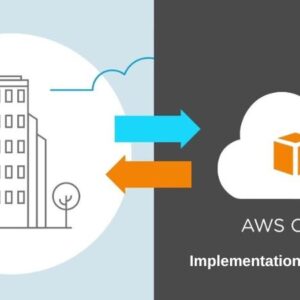Best Cloud Service Providers Shortlist
Here’s the shortlist of the best cloud service providers and what I think each does best, with more options below:
- Amazon Web Services (AWS): Best for enterprise-level cloud services
- Microsoft Azure: Best for hybrid cloud solutions
- Google Cloud Platform: Best for machine learning and data analytics
- IBM Cloud: Best for highly secure cloud services
- Oracle Cloud: Best for business-critical applications
- Hexafusion: Best for bespoke cloud services
- Rackspace: Best for managed cloud services
- Digital Ocean: Best for startups and small businesses
- Heroku: Best for app development and deployment
- Vultr: Best for affordable cloud hosting
- Scaleway – Best for European cloud services
- Cloudflare – Best for content-driven businesses
In this article, I’ll cover a range of tools suited to different business models, with key insights into the top features, integrations, and costs. I’ll also run through the pros and cons for each tool to help you understand which cloud service provider fits your company best.
What Is a Cloud Service Provider?
Cloud service providers offer a range of tools and services that help you manage your cloud resources, such as monitoring, analytics, automation, and storage. These services are separated into three main categories: Infrastructure as a Service (IaaS); Platform as a Service (PaaS); and Software as a Service (SaaS).
IaaS gives you virtual computing resources to help you store and connect, like cloud servers and networks.
PaaS provides you with development and deployment environments to create and run applications.
SaaS is any kind of software application offered through the internet.
Overviews of the 23 Best Cloud Service Providers
Here’s my top ten list of cloud companies providing an excellent range of tools, high-grade security, and reliable networks.
1. Amazon Web Services (AWS) – Best for enterprise companies
If you’ve used any cloud computing service, it’s probably Amazon. It has a comprehensive range of IaaS, PaaS, and SaaS products, seamlessly connected together to provide a full service platform. While it’s great for enterprise businesses, it can be overly-complex for smaller companies.
Why I picked Amazon Web Services: Enterprise companies not only need smooth-running operations and customizable database storage. They also need a reliable platform that makes it easy for them to connect and manage complex enterprise workloads. AWS gets first place for me, because it does this so well.
It’s got the range of tools and breadth of infrastructure big organizations need. It’s also easy to use for large, complex operations and provides top-grade security.
Amazon Web Services Standout Features and Integrations:
Standout features include its broad range of enterprise-level cloud services on a high-performance computing infrastructure. This is complemented by its library of third-party integrations through the AWS Marketplace. It also integrates with lots of popular enterprise tools, like Salesforce, SAP, and Oracle.
Integrations include Salesforce, Oracle, SAP, Adobe, Microsoft, IBM, Tableau
Pricing: Pay-as-you-go pricing model based on usage and cost optimization
Trial: Free tier for new customers.
Pros:
- Comprehensive range of cloud services across all three cloud service categories
- Easy-to-use platform to connect, manage, and automate large operations
- High availability and good disaster recovery options
- Cost optimization features
Cons:
- Complex to navigate for new users and small businesses
- Scaling is expensive compared to other tools
- Requires technical expertise to manage effectively
2. Microsoft Azure – Best for hybrid environments
Microsoft Azure offers infrastructure, platform, and software as a service, with a focus on hybrid cloud solutions. It offers customizable data sharing options for onsite and offsite networks, with a range of hybrid applications to develop and deploy public and private applications.
Why I picked Microsoft Azure: If you need excellent security and comprehensive control of your hybrid cloud experience, Microsoft Azure is my top pick. It offers a range of services designed to support both public and private cloud deployments, with a robust infrastructure and flexible customization. Plus, it’s easy to integrate with on-premises infrastructure.
Microsoft Azure Standout Features and Integrations:
Standout features include its strong support for hybrid cloud environments on a highly-robust computing infrastructure. There’s a range of third-party integrations through its Azure Marketplace to support hybrid cloud computing , and it integrates with most popular tools.
Integrations include Salesforce, Oracle, SAP, GitHub, Docker, and Kubernetes.
Pricing: Pay-as-you-go pricing, dependant on use
Trial: There’s a free trial
Pros:
- Strong support for hybrid cloud solutions
- Comprehensive range of cloud services and tools, focused on hybrid setups
- High availability and disaster recovery options
Cons:
- Can be complex to navigate for new users
- Integrating with non-Microsoft tools is harder than other platforms
3. Google Cloud Platform: Best for machine learning and data analytics
Google also offers a full-suite of cloud services — IaaS, PaaS, and SaaS. It’s great for data-centric companies who want an easy-to-digest platform because it has advanced machine learning and data analytics capabilities.
Why I picked Google Cloud Platform: If you’re optimizing your operations by using data, GCP can manage and store large amounts of data in lots of different formats. It has incredibly advanced machine learning tools and capabilities that help you to interpret numeric, image, text, video, and speech data, and the platform presents it in an easy-to-digest format.
Google Cloud Platform Standout Features and Integrations:
Standout features include its advanced machine learning and data analytics capabilities, and a range of data management and storage tools. There’s excellent security measures and the platform is easy to understand. GCP also offers a wide range of third-party integrations through its Cloud Marketplace and seamless integration with most popular platforms.
Integrations include Stripe, Shopify, Salesforce, HubSpot, Mailchimp, WordPress, MongoDB
Pricing: Pay-as-you-go pricing, dependent on usage
Trial: You get $300 credit to trial the product
Pros:
- Seamless integration with on-premises infrastructure
- Comprehensive range of data-driven cloud services
- High availability and disaster recovery options
Cons:
- Can be complex to navigate for new users
- Cost can be high for heavy usage
4. IBM Cloud – Best cloud security
IBM also provides IaaS, PaaS, and SaaS, but it’s best known for its strict security protocols. It integrates with popular developer tools and it’s got a wealth of secure third-party integrations.
Why I picked IBM Cloud: IBM is known for security. I found that it has comprehensive security solutions and security governance features that provide frameworks and methodologies to manage risks and avoid threats. The threat intelligence system is highly responsive and all data is encrypted and safeguarded.
IBM Cloud Standout Features and Integrations:
Standout features include top-shelf security solutions such as IBM Cloud Pak, IBM Security Guardium, and IBM QRadar, as well as robust security governance frameworks and services. It has advanced data encryption and proactive threat intelligence mechanisms. There’s also a wide range of third-party integrations through its Cloud Marketplace.
Integrations include: GitHub, Slack, Splunk, Datadog, Sumo Logic, F5
Pricing: Pay-as-you-go pricing based on usage
Free Trial One-Liner: It has a free tier as a trial, offering $200 credit
Pros:
- Highly secure cloud services with advanced security and compliance tools
- Offers a range of infrastructure, platform, and software as a service
- Flexible pricing options, including reserved instances for cost optimization
Cons:
- Security and compliance features may not be necessary for all organizations
- Limited integrations compared to other cloud providers
5. Oracle Cloud – Best for business-critical applications
Oracle Cloud has a full-suite of cloud services, focused on business-critical applications. The platform offers enterprise-level performance and reliability with comprehensive database solutions and a range of tools to manage critical cloud operations.
Why I picked Oracle Cloud: If I were running applications that are critical to your day-to-day business, I’d use Oracle Cloud. Its services are specifically designed for the mission-critical parts of your business, with a focus on complex data management. It has a powerful, resilient infrastructure, with high availability and integrates with business-critical applications.
Oracle Cloud Standout Features and Integrations:
Standout features include its enterprise-grade performance and reliability with fault-tolerant architecture, automatic backup and recovery, and advanced networking capabilities. It offers advanced database and analytics tools, like Oracle Autonomous Database, a self-driving, self-securing, and self-repairing database. There’s good disaster recovery mechanisms and it integrates with popular tools.
Integrations include Salesforce, Microsoft, NetSuite, Adobe, Zoho, Red Hat
Pricing: Pay-as-you-go pricing based on use
Trial: The free tier has tools that are free forever, and you get a $300 credit to trial premium features
Pros:
- Focus on business-critical applications, including advanced database and analytics tools
- Flexible pricing options, including reserved instances for cost optimization
- High availability and disaster recovery options
Cons:
- Challenging user interface and documentation
- Performance issues with large datasets
6. Hexafusion – Best for bespoke cloud solutions
Hexafusion is the go-to choice for businesses seeking bespoke cloud services. Offering full-service customized IT solutions, Hexafusion’s main focus is on tailoring services to particular company requirements.
Why I picked Hexafusion: Instead of offering a few generic plans, Hexafusion’s team takes the time to understand each business’s unique needs and then designs and deploys a customized cloud solution to fit. Plus, you get a dedicated cloud specialist for comprehensive support.
Hexafusion Standout Features and Integrations:
Standout features include its ability to provide tailored cloud services with a custom cloud design tool, dedicated cloud support specialists, and a data migration aid. Hexafusion also features robust security measures, to protect data at all times.
Integrations include: Salesforce, Google Workspace, AWS, Azure, Docker, and Jira
Pricing: Custom pricing
Trial: Free consultation
Pros:
- Bespoke, industry-specific cloud solutions for each business
- Excellent customer support and dedicated cloud specialists
- High availability and minimum downtime
Cons:
- It’s more expensive than one-size-fits-all solutions
- If you have basic requirements, this isn’t the right fit
7. Rackspace – Best for managed cloud services
Rackspace cloud services have been around for a long time. It’s a very established cloud service provider that offers managed cloud services for businesses, such as infrastructure management, database management, and security. Rackspace cloud solutions are best for companies that don’t have the time or expertise to manage their services.
Why I picked Rackspace: It’s been the leader in managed cloud services for years for a reason. All clients get a dedicated account team that works closely with them to provide tailor-made cloud services. And it’s not a set-it-and-forget-it solution — Rackspace proactively monitors and manages your services to spot any problems and optimize your systems so you don’t have to.
Rackspace Standout Features and Integrations:
Standout features include fully managed cloud services with 24/7 support from experienced technicians, and a dedicated team managing your account. Rackspace also has a high-performing computing infrastructure and advanced database management services, so you’re not losing out on network or storage capabilities.
Integrations include: Salesforce, Microsoft Office 365, Google Workspace, AWS, Azure, and Slack
Pricing: Custom pricing based on individual business needs
Trial: Offers a free consultation with a cloud expert
Pros:
- Expertise in managing popular cloud platforms and hybrid multi-cloud environments
- Excellent security features, such as network and endpoint security, intrusion detection, and vulnerability management
- 24/7 support from experienced technicians
Cons:
- Customer service isn’t great for smaller customers or those with lower service levels
- May not be suitable for businesses that want full control over their cloud environment
8. Digital Ocean – Best for startups and small businesses
Digital Ocean offers cloud infrastructure for startups and small businesses. It’s ideal for organizations that need a simple, intuitive interface that makes it easy to onboard small teams quickly.
Why I picked Digital Ocean: I find that small teams don’t often have a lot of complex IT expertise. You need a tool that’s got a super-friendly interface that’s easy to train your teams on. But, you also need a CSP that’s affordable, with tools that are geared toward small-to-medium businesses (SMBs).
Digital Ocean offers all these things: great price, excellent range of features, easy-to-understand cloud computing platform.
Digital Ocean Standout Features and Integrations:
Standout features include its easy-to-manage interface on a high-performing infrastructure. There’s support for a wide range of programming languages and frameworks, a comprehensive API, and great developer resources. Cloud storage solutions are scalable, and it integrates seamlessly with lots of popular tools and platforms.
Integrations include: Slack, GitLab, GitHub, WordPress, MongoDB, PostgreSQL
Pricing: Simple, bolt-on pricing based on usage and requirements
Trial: There’s a 60-day free trial
Pros:
- Affordable pricing for startups and small businesses
- User-friendly interface for easy management of cloud infrastructure and quick training
- Advanced computing infrastructure for reliable services
Cons:
- Unsuitable for larger businesses with more enterprise service requirements
- Services are limited compared to larger, more established cloud computing providers
9. Heroku – Best for app development and deployment
Heroku is a fully-managed, cloud-based platform that’s designed for building and deploying apps. It has a scalable cloud infrastructure that supports a wide range of programming languages and it integrates with most popular developer tools.
Why I picked Heroku: If you’re building and deploying apps, you need a services provider that offers the development tools to do this. I’m impressed by Heroku because it’s highly flexible for programmers, supporting a range of languages and frameworks, while also offering a secure, reliable infrastructure that makes it easy to scale app development.
Heroku Standout Features and Integrations:
Standout features include its support for multiple programming languages and frameworks and its seamless integration with popular developer tools and platforms. Its scalable cloud infrastructure features built-in load balancing and auto-scaling, while the platform is secure and compliant. There’s also built-in monitoring, logging, and alerting tools to help you improve app performance and reliability.
Integrations include Salesforce, GitHub, AWS, MongoDB, Travis CI, CircleCI, and Jenkins
Pricing: There are three monthly packages based on business needs, starting at $5
Trial: There’s no free plans or trial
Pros:
- Intuitive developer-targeted platform for building and deploying apps quickly and easily
- Support for multiple programming languages and frameworks
- High level of flexibility and agility, easy to test and iterate
Cons:
- May not be suitable for businesses that require fine-grained control over their app environment
- Heavy usage is pricey
10. Vultr – Best for affordable cloud hosting
Vultr only offers infrastructure as a service, with data centers located worldwide. Its scalable cloud hosting solutions are affordable and easy-to-manage.
Why I picked Vultr: I found that Vultr offered the most cost-effective option for cloud hosting services. It has a range of affordable plans for fast SSD storage on a worldwide network. But, it’s not just the price that makes it affordable — the platform is easy to use, so your teams won’t need much training.
Vultr Standout Features and Integrations:
Standout features include its affordable cloud hosting plans for fast SSD storage on a high-performance global network. The intuitive platform features one-click apps and simple API integrations, along with customization features and top-grade security.
Integrations include Docker, Kubernetes, Plesk, cPanel, GitLab, Cloudflare
Pricing: Pay-as-you-go pricing with competitive prices for cloud hosting plans
Trial: New customers get $100 credit to trial the product
Pros:
- Affordable cloud hosting plans with competitive prices
- Fast SSD storage and high-performance global network
- Flexible payment options, including hourly and monthly billing
Cons:
- Only offers IaaS
- No phone support for technical issues
11. Scaleway – Best for European cloud services
Another IaaS provider, Scaleway offers cloud services to the European market. Fully compliant with all European data protection regulations, Scaleway offers high-grade security cloud storage solutions.
Why I picked Scaleway: If you need cloud storage services in Europe, Scaleway has the coverage and compliance figured out for you. The cloud migration process is straightforward and it’s easy to understand how the platform works.
Scaleway Standout Features and Integrations:
Standout features include its high-performing IaaS network hosted in Europe, with reliable European data centers. It’s fully compliant with European data protection regulations and features top-class security.
Integrations include Ansible, Docker, Magento, WordPress, Terraform, Plesk, cPanel
Pricing: Pay-as-you-go pricing with competitive prices for European services
Trial: Offers a €100 credit for new customers
Pros:
- Cloud services hosted in Europe with a focus on security and compliance with European data protection regulations
- Flexible and customizable infrastructure with API-driven automation
- Competitive pricing and transparent billing
Cons:
- Only IaaS, no PaaS or SaaS
- Not suitable for companies without a European focus
12. Cloudflare – Best for content-driven businesses
Cloudflare is a content delivery network (CDN) service provider, offering cloud services to store, manage, and deliver content efficiently. It’s geared up for organizations that require fast and secure delivery of web content, offering a range of services such as CDN, security, DNS, and DDoS protection.
Why I picked Cloudflare: Cloudflare comes out on top for delivering content in a fast and reliable way. It has the tools to streamline the process and the security and performance features to support efficient content delivery. The interface is simple to navigate, making it easy for sales and marketing teams to work it out.
Cloudflare Standout Features and Integrations:
Standout features include powerful content delivery network (CDN) capabilities and advanced security features, including DNS and DDoS protection. There’s an easy-to-use interface with comprehensive analytics and reporting, and it integrates with popular web platforms like WordPress, Shopify, and GitHub There’s also a range of APIs and developer tools for customization and automation.
Integrations include WordPress, Shopify, GitHub, Salesforce, HubSpot, Google Cloud Platform
Pricing: Choose from a range of pricing plans, starting at $20 a month.
Trial: There’s a free tier for new customers with limited usage and services.
Pros:
- Powerful content delivery network (CDN) capabilities that enhance website performance
- Comprehensive security and performance features that improve the user experience
- User-friendly interface with detailed analytics and reporting
- Flexible pricing plans that suit a range of budgets and usage requirements
Cons:
- Limited customization options for advanced users
- Some features are only available on higher-tier pricing plans
Other Options
Didn’t find what you were looking for? Here are a few of my other favorite CSPs, geared toward more specific use cases:
- Digital Realty: Best for colocation and interconnection services
- Wasabi: Best for high-speed, low-latency cloud storage
- Linode: Best for customizable VPS hosting
- Joyent: Best for high-performance cloud hosting
- Box: Best for secure cloud storage
- Backblaze: Best for unlimited cloud backup
- Tencent Cloud: Best for Asian markets
- ProfitBricks: Best for customizable cloud solutions
- Google Firebase: Best for mobile and web application development and hosting
- Aruba Cloud: Best for cost-effective cloud solutions
- Kamatera: Best for flexible cloud services with pay-as-you-go pricing
Selection Criteria For Cloud Service Providers
Here’s a short summary of the main selection and evaluation criteria I used to develop my list of the best cloud service providers for this article:
Core Functionality
First, I evaluated and compared a wide range of popular cloud service providers that offer IaaS, PaaS, and/or SaaS.
Here are the basic functionalities I’m looking for from the providers on my list:
- High-quality cloud storage and storage solutions
- Suitable cloud service tools and APIs
- Scalable cloud infrastructure
- Reliability and performance measures, like load balancing
- Backup and disaster recovery
Key Features
Here are the key features I look for when selecting cloud service providers to make my top ten:
- High-performance computing infrastructure: You need a robust and scalable computing infrastructure that can handle demanding workloads efficiently, for fast processing and quicker response times.
- Advanced machine learning, artificial intelligence, and data analytics capabilities: Powerful tools and services help you create powerful connections and automations between your systems. Analytics help you make more accurate decisions based on real-time data.
- Flexible and customizable deployment options: You need a cloud service provider that gives you the right deployment options for your business, such as public, private, and hybrid. You should be able to tailor the right tool to your needs.
- User-friendly interface: You need a tool that’s intuitive to use, so that you can train your teams to leverage it quickly.
- Comprehensive analytics and reporting: Comprehensive reporting systems can help you use your data to drive better decision-making.
- Integration with popular third-party tools and platforms: Seamless integration with popular tools and platforms, such as development frameworks, databases, and automation tools, enables you to connect to your existing systems easily.
- Robust disaster recovery: Your CSP should have robust disaster recovery capabilities, including data replication and failover mechanisms. This minimizes downtime and reduces risk.
Usability
The easier the CSP is to use, the quicker your teams get on board and you can leverage the tools and services to accelerate growth. Here’s what I look for:
- User-friendly interface and intuitive navigation
- Clear and comprehensive documentation and support resources
- Simple and efficient setup and management processes
- Compatibility with existing tools and workflows
Security and Compliance
Managing and securing data is serious business. Your cloud service provider should have strict security and compliance features, such as:
- Compliance with industry-specific regulations and standards
- Strong access controls and authentication mechanisms
- Data encryption and protection
- Strong network security measures
Geographic Reach
Your cloud service provider needs to offer services that work with your geographic region, for faster, more reliable services. You need:
- Coverage and low-latency connectivity in relevant regions
- Disaster recovery measures in different regions
- Compliance with local laws and regulations
Price
You can find CSPs for every budget, but I look for providers that provide:
- Transparent pricing models and clear billing practices
- Flexible pricing options to accommodate changing needs and usage patterns
More Cloud Software Reviews
- Cloud PaaS
- Cloud development platforms
- Cloud storage software
- Cloud management platforms
- Virtualization software
- Cloud migration solutions
- Private and hybrid cloud providers
- Multi-cloud solutions
- Cloud governance tools
- Cloud directory solutions
- Cloud backup solutions
- IoT cloud platforms
- Google Cloud alternatives
What now?
With my list of top cloud service providers, you’re equipped to make an informed decision about which provider is right for your business. But cloud services are just the beginning. To stay on top of the latest tools that build SaaS teams and systems that scale, subscribe to The CTO Club Newsletter.





